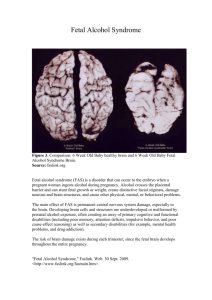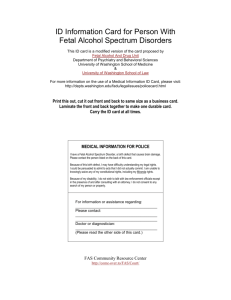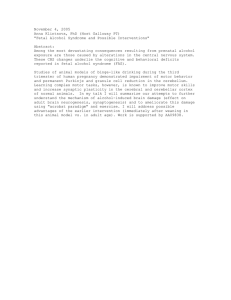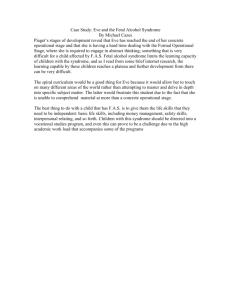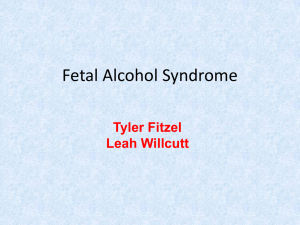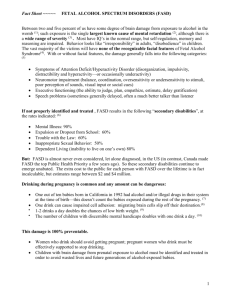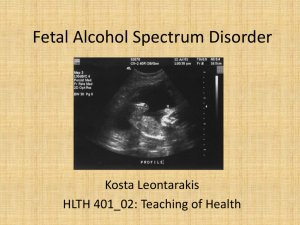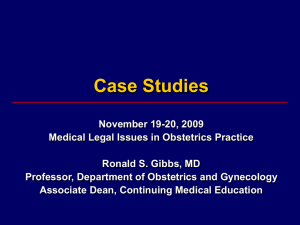Bibliography Bringing a women centred and culturally informed approach to fetal... syndrome prevention targeting northern Saskatchewan First Nations women
advertisement
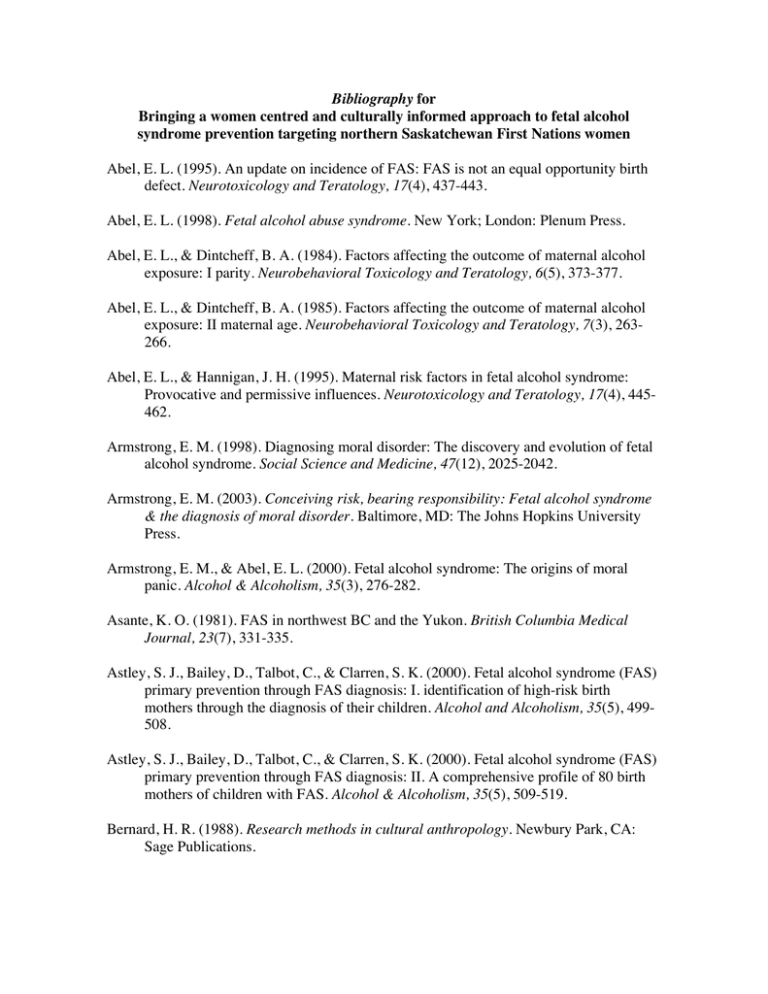
Bibliography for Bringing a women centred and culturally informed approach to fetal alcohol syndrome prevention targeting northern Saskatchewan First Nations women Abel, E. L. (1995). An update on incidence of FAS: FAS is not an equal opportunity birth defect. Neurotoxicology and Teratology, 17(4), 437-443. Abel, E. L. (1998). Fetal alcohol abuse syndrome. New York; London: Plenum Press. Abel, E. L., & Dintcheff, B. A. (1984). Factors affecting the outcome of maternal alcohol exposure: I parity. Neurobehavioral Toxicology and Teratology, 6(5), 373-377. Abel, E. L., & Dintcheff, B. A. (1985). Factors affecting the outcome of maternal alcohol exposure: II maternal age. Neurobehavioral Toxicology and Teratology, 7(3), 263266. Abel, E. L., & Hannigan, J. H. (1995). Maternal risk factors in fetal alcohol syndrome: Provocative and permissive influences. Neurotoxicology and Teratology, 17(4), 445462. Armstrong, E. M. (1998). Diagnosing moral disorder: The discovery and evolution of fetal alcohol syndrome. Social Science and Medicine, 47(12), 2025-2042. Armstrong, E. M. (2003). Conceiving risk, bearing responsibility: Fetal alcohol syndrome & the diagnosis of moral disorder. Baltimore, MD: The Johns Hopkins University Press. Armstrong, E. M., & Abel, E. L. (2000). Fetal alcohol syndrome: The origins of moral panic. Alcohol & Alcoholism, 35(3), 276-282. Asante, K. O. (1981). FAS in northwest BC and the Yukon. British Columbia Medical Journal, 23(7), 331-335. Astley, S. J., Bailey, D., Talbot, C., & Clarren, S. K. (2000). Fetal alcohol syndrome (FAS) primary prevention through FAS diagnosis: I. identification of high-risk birth mothers through the diagnosis of their children. Alcohol and Alcoholism, 35(5), 499508. Astley, S. J., Bailey, D., Talbot, C., & Clarren, S. K. (2000). Fetal alcohol syndrome (FAS) primary prevention through FAS diagnosis: II. A comprehensive profile of 80 birth mothers of children with FAS. Alcohol & Alcoholism, 35(5), 509-519. Bernard, H. R. (1988). Research methods in cultural anthropology. Newbury Park, CA: Sage Publications. Brant-Castellano, M. (2008). Aboriginal ethics guide ethical research. Visions: BC's Mental Health and Addictions Journal, 5(1), 22-23. Bray, D. L., & Anderson, P. D. (1989). Appraisal of the epidemiology of fetal alcohol syndrome among Canadian Native peoples. Canadian Journal of Public Health, 80(1), 42-45. Browne, A. J., & Fiske, J. (2001). First Nations women's encounters with mainstream health care services. Western Journal of Nursing Research, 23(2), 126-147. Charmaz, K. (Ed.). (2000). "Grounded theory: Objectivist and constructivist methods," in the handbook of qualitative research. London, UK: Sage Publications. Clarren, S. (2005). Presentation to Canada northwest fetal alcohol spectrum disorder research network board of directors. February 25, 2005. Victoria, British Columbia. Cruikshank, J. (1998). The social life of stories: Narratives and knowledge in the Yukon territory. Lincoln, NE: University of Nebraska Press. Jones, K. L., & Smith, D. W. (1973). Recognition of the fetal alcohol syndrome in early infancy. The Lancet, 3(302), 999-1001. Keesing, R. M. (1992). Custom and confrontation: The Kwaio struggle for cultural autonomy. Chicago, IL: The University of Chicago Press. Kelm, M. (1998). Colonizing bodies: Aboriginal health and healing in British Columbia 1900-50. Vancouver, BC: UBC Press. Kirmayer, L. J., Brass, G. M., & Tait, C. L. (2000). The mental health of Aboriginal peoples: Transformations of identity and community. Canadian Journal of Psychiatry, 45(7), 607-616. Lock, M. (1993). Encounters with aging: Mythologies of menopause in Japan and North America. Berkeley, CA: University of California Press. Muhr, T. (2001). Atlas-ti: The workbench. Retrieved from http://www.atlasti.com/. Perks, R., & Thomson, A. (1998). Introduction. The oral history reader (pp. 1-8). London, UK: Routledge. Poole, N. (1997). Alcohol and other drug problems and BC women: A report to the minister of health from the minister's advisory council on women's health. Victoria, BC: British Columbia Ministry of health and ministry responsible for seniors. Roberts, G., & Nanson, J. L. (2000). Best practices: Fetal alcohol syndrome/fetal alcohol effects and the effects of other substance use during pregnancy. Ottawa, ON: Health Canada. Robinson, G. C., Conry, J. L., & Conry, R. F. (1987). Clinical profile and prevalence of fetal alcohol syndrome in an isolated community in British Columbia. Canadian Medical Association Journal, 137(3), 203-207. Scarry, E. (1985). The body in pain: The making and unmaking of the world. New York, NY: Oxford University Press. Smylie, J., Kaplan-Myrth, N., Tait, C. L., Martin, C. M., Chartrand, L. N., Hogg, W., et al. (2004). Health sciences research and Aboriginal communities: Pathway or pitfall? Journal of Obstetrics and Gynaecology Canada, 26(3), 211-216. Smylie, J., Mary Martin, C., Kaplan-Myrth, N., Steele, L., Tait, C. L., & Hogg, W. (2003). Knowledge translation and Indigenous knowledge. International Journal of Circumpolar Health, 63(Suppl 2), 139-143. Tait, C. L. (2000). A study of the service needs of pregnant addicted women in Manitoba. Winnipeg, MB: Prairie Women's Health Centre of Excellence. Tait, C. L. (2003). “The tip of the iceberg": The “making” of fetal alcohol syndrome in Canada. Unpublished Doctor of Philosophy, Department of Anthropology, McGill University, Montreal, Quebec, Canada. Tait, C. L. (2003). Fetal alcohol syndrome among Canadian Aboriginal peoples: Review and analysis of the intergenerational links to residential schools. Ottawa, ON: Aboriginal Healing Foundation. Tait, C. L., Bassingthwaite, T. A., & Lafontaine, T. (2007). Pakeeway house: Healthy women, healthy families. Saskatoon, SK: Indigenous Peoples Health Research Centre. Waldman, H. B. (1989). Fetal alcohol syndrome and the realities of our time. Journal of Dentistry for Children, 56(6), 435-437. Waldram, J. B., Herring, D. A., & Young, T. K. (1995). Aboriginal health in Canada: Historical, cultural, and epidemiological perspectives. Toronto, ON: University of Toronto Press Incorporated. Walmsley, J. (1998). Life history interviews with peoples with learning disabilities. In R. Perks, & A. Thomson (Eds.), The oral history reader (pp. 126-139). London, UK: Routledge.
